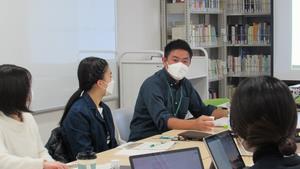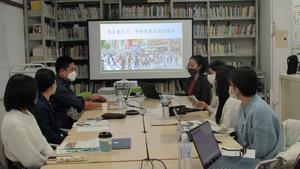- Global Collaboration Center
- Activity
- Report on the 24th SDGs (Sustainable Development Goals) Seminar “Support for Nikkei and Nikkei Communities Abroad” (Dec.2022)
ページの本文です。
Report on the 24th SDGs (Sustainable Development Goals) Seminar “Support for Nikkei and Nikkei Communities Abroad” (Dec.2022)
2023年4月21日更新
On Tuesday, December 20, 2022, Kazuya Ishimori, President of Aristotele’s Window, spoke at the 24th SDGs Seminar, with the theme "Support for Nikkei and Nikkei Communities Abroad." Mr. Ishimori has experience working in Brazil as a JICA (Japan International Cooperation Agency) Overseas Cooperation Volunteer (Nikkei Community Volunteer) and talked about the new perspectives on life he gained from meeting and interacting with different cultures in the region.
Brazil is known as the country with the largest population and area in Latin America, and as the country with the largest population of Nikkei among all countries except Japan. Since the ancestors of Nikkei were Japanese who came from Japan, I had a prejudice that Nikkei are very similar to Japanese in culture and have a strong Japanese soul. However, after listening to Mr. Ishimori's lecture and later visiting the JICA Overseas Migration Museum as part of the class, I realized that Nikkei are more like a "race" with the same roots as Japanese, but with a completely different and unique culture. I believe that this is due not only to the separation from Japanese culture due to World War II, but also to the ethnic diversity of Brazil and the lack of intervention by Japanese government during the emigration process.
The biggest difference Mr. Ishimori felt in "Japan's parallel world," of Brazil was whether to live in the present or in the future. Japanese people, who look ahead and are very anxious about the future, are always worried about economic problems or preoccupied with knowledge and success, and as a result they miss opportunities for their own happiness. However, in the current darkness era, experience is an asset, and meeting and talking with "others" can greatly change one's perspective and create harmony in the future. Mr. Ishimori's talk was an encounter with "otherness" for us, and it also made us aware that we should not be satisfied with just words, but rather cherish what we feel "now" and connect it to our experience. It was an opportunity for us to look at the first step that lies within ourselves, that we have not taken because we have been too eager to pursue what we call "results".
In connection with my visit to the JICA Overseas Migration Museum, I realized that the Nikkei were "near but far" to me. As I mentioned earlier, I had assumed that because of their roots, the Nikkei were as close to the Japanese as they were to me, and in my mind, they were a thing of the past. However, it is more accurate to think of Nikkei as a kind of ethnic group related to "Japanese," and as an entity with a unique culture that is still changing today. Immigrants, which today is now often seen as a problem or as an unfortunate impression in other countries, was also something closely related to the Japanese people. I have never thought about these two events in relation to each other, and although I have been interested in the current immigration issue, which is often the focus of attention, I have rarely thought about the past immigration issue, which is also closely related to Japan. By making these connections and reflecting on them, I learned that it is not the immigrants themselves that need to be resolved, but the circumstances that forced them to leave their home countries. I also learned that it is necessary to face immigrants as a culture and respect both sides through continuous dialogue, rather than seeing them as the scourge of another country, and that information in the media is provided from the third party’s perspective, and that there is nothing better than experiencing and feeling the situation with one's own five senses.
I have been absorbing knowledge for a long time, but now in the university environment, where I can seek out and obtain opportunities on my own, I have realized once again that I should value myself more than ever in the "here and now" and gain experience without being afraid of things.
(Yuna Ogawa, sophomore student, Department of Psychology, Faculty of Human Life and Environmental Sciences)
【Related Links】
※About JICA's volunteer programs
※About JICA Yokohama Center












